
Saturday 12th October 2019
7:30pm
Performance Ends 10:05pm
Sunday 13th October 2019
3:00pm Matinée
Performance Ends 5:35pm
Tuesday 15th October 2019
7:30pm
Performance Ends 10:05pm
Pre-Performance Talk: Introduction to the Opera
One hour before each performance, an informative free talk will be given to ticket holders for the performance. The talk will last 25mins approximately and will be given by our host, George Fleeton. No booking is necessary and will be held in the Carolan Suite. Admission is FREE.
Sung in Italian with English surtitles
The National Concert Hall, Dublin
Box Office: +353 (0) 1 417 0000 or www.nch.ie
-
Set in 18th Century Seville, Gioachino Rossini’s greatest masterpiece is brought to vivid life at Lyric Opera. When the handsome Count Almaviva falls hopelessly in love with the beautiful Rosina, he solicits Figaro, the town’s wily barber, to help win her favour and to make a fool of her ridiculous guardian, Dr. Bartolo.
It is a fairy tale of twists and turns, mistaken identities and where young love triumphs all wrapped up in Rossini’s unmistakable and masterful music.
-
Il Barbiere di Siviglia
BY GIOACHINO ROSSINI
LIBRETTO BY CEARE STERBINI FROM THE HOMONYMOUS COMEDY BY PIERRE-AUGUSTIN CARON DE BEAUMARCHAIS.PREMIÉRE:
Teatro Argentina, Rome, 20 February 1816
ACT I – Outside Dr. Bartolo’s House
The one where Figaro’s here, Figaro’s there, Figaro’s helping Count Almaviva to abduct Rosina from her nasty old guardian Doctor Bartolo.
Night at the OperaCount Almaviva arrives, in disguise, to the house of the elderly Dr. Bartolo to serenade his young ward, Rosina. Dr. Bartolo intends to marry Rosina, and he’s confined her to his house.
Figaro, the local barber, has access to the homes of Seville’s elite. He knows the town’s secrets and scandals. He arrives at Dr. Bartolo’s home and pledges his help to Count Almaviva, who takes on the persona of “Lindoro,” a poor student who hopes young Rosina will love him not because he’s a nobleman, but for himself. To enter Bartolo’s house, Figaro devises a plan: The Count will disguise himself as a drunken soldier with orders to be quartered at Dr. Bartolo’s. Then, he can declare his love for Rosina.
Alone in the house, Rosina reflects on the voice that has enchanted her and resolves to use her considerable charm to meet “Lindoro.” Dr. Bartolo enters with Rosina’s music master, Don Basilio, who warns him that Count Almaviva (Rosina’s admirer) has been seen in Seville. Dr. Bartolo decides to marry Rosina immediately – before any other suitor can have her. Figaro overhears this, warns Rosina and promises to deliver a letter from her to “Lindoro.”
Disguised as a drunken soldier, Almaviva passes Rosina a note, which she manages to hide from Dr. Bartolo, who argues that he has exemption from housing soldiers. An argument ensues between the Count and Dr. Bartolo.
Figaro enters and announces that a curious crowd has gathered in the street. The city guards burst in to arrest the drunk and disorderly soldier. The Count quietly reveals his true identity to the captain of the guards. He’s released, to Dr. Bartolo’s chagrin and everyone’s amazement.
ACT II – Inside Dr. Bartolo’s House
Dr. Bartolo, alone in his study, suspects the “drunken soldier” was a spy. The Count returns, this time disguised as Don Alonso, a music teacher and student of Don Basilio. He says he’s come to give Rosina her music lesson instead of Basilio, who’s at home sick. “Don Alonso” tells Dr. Bartolo he’s staying at the same inn as Almaviva and has found Rosina’s letter. He offers to tell Rosina it was given to him by another woman, proving Lindoro is toying with her. This convinces Dr. Bartolo that “Don Alonso” is a true student of Don Basilio, and he allows him to give Rosina her music lesson.
Figaro arrives to give Dr. Bartolo his shave and manages to snatch the key that opens the balcony shutters. The shaving is about to begin when Don Basilio shows up looking perfectly healthy. To get the meddlesome Basilio out of the way, Figaro convinces him he has scarlet fever and should go to bed at once. With Basilio out of the way, the shaving begins and distracts Dr. Bartolo from hearing Almaviva plotting with Rosina to elope that night. But, Dr. Bartolo hears the phrase “my disguise” and realizes he’s been tricked again.
Later that evening, Basilio is summoned by Dr. Bartolo and is told to bring a notary so Rosina and Bartolo can be married. Dr. Bartolo then shows Rosina her letter to Lindoro as proof that Lindoro is tricking her. Convinced she’s been deceived, she agrees to marry Dr. Bartolo and tells him of the plan to elope with Lindoro.
After a thunderstorm, Figaro and the Count climb over the wall into Bartolo’s house. Rosina is furious with them, until Almaviva reveals his identity and professes his love for her. Basilio arrives with the notary.
Bribing and threatening him, Basilio agrees to be a witness to the marriage of Rosina and Count Almaviva. Dr. Bartolo arrives with soldiers, but it’s too late. Count Almaviva explains to Dr. Bartolo that it’s useless to protest, and Dr. Bartolo accepts he has been beaten. Figaro, Rosina and the Count celebrate their good fortune.
-
Figaro
Georgios Iatrou
Rosina
Grace Durham
Almaviva
Randall Bills
Dr. Bartolo
Charles Johnson
Bertha
Sandra Oman
Don Basillo
John Molloy
Fiorallo
Rory Dunne
Lyric Opera Chorus & Lyric Opera Orchestra
-
Conductor
Timothy Burke
Director
Cav. Vivian J. Coates
Chorus Master
Richard McGrath
-
Count Almaviva, a Young Count
Tenor
Figaro, Barber
Britone
Rosina, Dr. Bertolo’s Pupil & Ward
Soprano
Basilio, Music Teacher & Somewhat Philosopher
Bass
Fiorello, Almaviva’s Servant
Baritone
Ambroglio, Bartolo’s Servant
Bass
Berta, Bartolo’s Maid
Soprano
An Officer
Bass
-
Full name: Gioachino Antonio Rossini
Nationality: Italian
Birth: February 29, 1792 Death: November 13, 1868
Parents: Giuseppe Rossini, trumpeter & Anna Guidarini, singer
Nickname: “Monsieur Crescendo”
Lived in: Bologna, Italy & Paris, France
Instruments played: Harpsichord, horn, violin, singerOperas: Wrote 39, including Il barbiere di Siviglia (1816), La cenerentola (1817), Semiramide (1823), Guillaume Tell (1829)
Employment: Composer, conductor, pianistHis Music
It is alleged that Rossini invented the Italian opera as we know it today, complete with overture, arias, scenas, and finales. His sing- able melodies caused instant popularity. Nearly all of his operas are comedies, complete with wit and relatable themes. Rossini was the composer to begin what we now know as the Bel canto era, defined literally as “beautiful singing”; a style of pure, smooth, flowing singing associated with the 18th Century.
Interesting Facts:
- Rossini was a huge foodie, he loved to cook and even invented his own dish, the tournedos Rossini.
- Rossini loved Mozart so much that he was nicknamed Tedeschino, the little German. • One of the few composers to die both wealthy and popular – a rarity in the opera world.
- He was also know as Mr. Crescendo due to the build up of sound in his mesmeric finales.
Looking at the whole story…!
The Beaumarchais Trilogy
The libretto or book of The Barber of Seville was written by Pierre Beaumarchais (1732- 1799), a French playwright, and is the first of a trilogy of plays, commonly known as the “Figaro Trilogy.” The plays all feature the same set of characters:
Count Almaviva
Rosina, the Countess
Figaro, the Barber
Cherubino, the page
Doctor Bartolo
Susanna, the maidLe Barbier de Séville — The Barber of Seville
The first opera of the trilogy where Count Almaviva falls in love with Rosina. The Count enlists the help of the local barber, Figaro to help her escape from under the nose of Doctor Bartolo. Much hilarity ensues!
Le Mariage de Figaro — The Marriage of Figaro
Second opera of the series. Rosina and the Count have now married, Figaro is the Count’s manservant and is marrying Susanna, Rosina’s maid. The Count is bored with his marriage and eyeing Susanna, throw in a horny page named Cherubino and prepare for the madness!
La Mère coupable — The Guilty Mother
The final opera of the trilogy. It is twenty years after the marriage of Figaro and the page Cherubino and Rosina the Countess have had a tryst. As a result, Rosina has an illegitimate child… and separately, so does the Count. Figaro and Susanna must once again save the day.
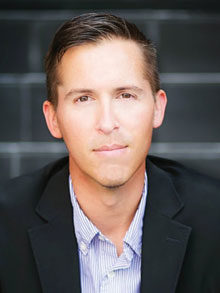
Randall Bills
BioRandall Bills
Hailed by Das Opernglas as a “vocally powerful, technically impressive, dominate heroic tenor” and praised by Opera News for “his consummate mastery of Rossini’s style, range and vocal bravura,” American tenor Randall Bills has earned praise from audiences and critics for performances in opera and concert throughout the world.
He has earned particular acclaim in Mozart’s Die Zauberföte as Tamino (Theatre Dortmund, Nationaltheater Mannheim, New Zealand Opera, Seattle Opera), Don Giovanni as Ottavio (Theater Osnabrück, Seattle Opera), and Cosi fan tutte as Ferrando (English National Opera, Teatro Lirico di Cagliair), and Rossini’s Armida as Geoffredo and Ubaldo (Rossini Opera Festival), Mose in Egitto as Osiride (New York City Opera), Il Barbiere di Siviglia as Almaviva (Oper Leipzig, Theater Wielki Poznań), La Cenerentola as Ramiro (Opernhaus Chemnitz, Boston Youth Symphony, El Paso Opera), and Ricciardo e Zoraide as Agorante (Rossini in Wildbad Festival). Other notable operas and roles he has performed include Bellini’s La Sonnambula as Elvino (Staatstheater Darmstadt), Donizetti’s La Favorité as Fernand (Washington Concert Opera), Don Pasquale as Ernesto (Staatstheater Darmstadt), Verdi’s La traviata as Alfredo (Deutsches Nationaltheater Weimar), Stravinsky’s The Rake’s Progress as Tom Rakwell (Staatstheater Braunschweig and the Oldenburgisches Staatstheater), Britten’s The Turn of the Screw as Prologue/Peter Quint (Teatro Comunale di Bologna), and Strauss’ Der Rosenkavalier as the Italian Singer (Theatre Bremen, Deutsches Nationaltheater Weimar).
Most recently, on the opera stage, Mr. Bills debuted at the International Händel-Festspiele Karlsruhe as Jupiter in Semele conducted by Christopher Moulds in a production from Floris Visser, as well as at Gothenburg Opera as Almaviva in Rossini’s Il barbiere di Siviglia conducted by Henrik Schaefer in a production from David Radok, returned to the Rossini in Wildbad Festival as Aménophis in a new production of Moïse et Pharaon conducted by Fabrizio Maria Carminati directed by Jochen Schönleber, and returned to the Theater Wielki Poznań again as Almaviva conducted by Massimiliano Caldi in a production from Marek Weiss-Grzesiński where he also made his role debut as Nemorino in L’elisir d’amore conducted by Katarzyna Tomala in a new production from Andrij Zholdak. Upcoming engagements include Il Conte d’Almaviva in Rossini’s Il barbiere di Siviligia with Lyric Opera Productions Dublin.
He has appeared as a guest of a number of orchestras, including the Houston Symphony (Orff’s Carmina Burana), Louisville Symphony (Berlioz’ Romeo et Juliette), Fresno Philharmonic (Beethoven’s Symphony No. 9), Naples Philharmonic (Britten’s Serenade for Tenor, Horn, and Strings and Beethoven’s Symphony No. 9), and Pasadena Symphony (Mozart’s Mass in C-minor and Beethoven’s Symphony No. 9), Los Angeles Master Chorale (Handel’s Messiah, Bach’s Christmas Oratorio, and Mozart’s Litaniae de venerabili), and Long Beach Mozart Festival Orchestra (Mozart’s Requiem).
European orchestra with whom he has appeared include the Hamburg Symphony Festival Orchestra (“Night of the Proms”), Bochum Symphony (Mozart’s Mass in c-minor), Verona (Italy) Teatro Filarmonico (Mendelssohn’s Elias), Vahrer Kantorei (Rossini’s Petite Messe Solennelle), Sinfonieorchester Wuppertal (Mendelssohn’s Lobegesang and Weber’s Freischütz-Messe), L’orchestra Sinfonica di Milano Giuseppe Verdi (Bach’s Johannes-Passion), American University of Beirut Choir and Choral Society (Bach’s Magnifcat and Händel’s Utrecht Jubilate). He has also appeared in Mexico with Philharmonic Boca del Río (Beethoven’s Symphony No. 9). Notable conductors with whom he has sung include Grant Gershon, Michael Guettler, Julia Jones, Jorge Mester, Jayce Ogren, Andrés Orozco-Estrada, Carl St. Clair, and Ralf Weikert.
Count Almaviva
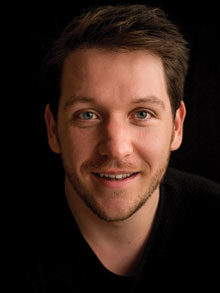
Georgios Iatrou
BioGeorgios Iatrou
Georgios Iatrou was born in Thessaloniki/Greece. At the age of five he received piano and cello lessons. At the age of 21 he took his first singing lessons at the State Conservatory of Thessaloniki. In 2010 he was accepted in the Music University of Cologne (Class Prof. Mario Hoff). He completed his masters at the Robert Schumann Hochschule in Düsseldorf (Prof. Konrad Jarnot, Anja Paulus). Georgios also studied Molecular Biology at the Demokritus University of Greece.
He is the winner of the song price at the Antonio Bertolini Competition in Milano 2016.
He performed Guglielmo (Cosi Fan tutte) at the Teatro Poliziano in Italy, Daniel (Anna Nicole – Marc Antony Turnage) at the Theater of Dortmund, Lehrbube (Die Meistersinger von Nürnberg) at the Opera of Cologne, Albert Herring, Deputierter (Don Carlos) and Tancredi (Monteverdi’s Il combattimento di Tancredi e Clorinda) at the Theater of Aachen, Eisenstein (Die Fledermaus) at the Musikhochschule Köln und Frank Maurrant (Street Scene) at the Robert Schumann Hochschule.
In summer 2011 he sang at the Young artists festival of Bayreuth. The WDR- radio produced with him and Amina Taikenova Lieder by Hanns Eisler. In 2014 he won the 1sr prize at the “Schmolz und Bickenbach“ Competition in the category Lied-Duo. He also won one of the additional prizes in the „Nei Stemmen“ international singing competition in Luxemburg.
Georgios was engaged at the Aalto Theater of Essen for the seasons 2015-16 and 2016-17 for the parts of Figaro (Il barbiere di Siviglia), Valentin (Faust), Schaunard (La bohème), Silvano (Un ballo in maschera), Kostandis (The greek passion) and Sprecher (Die Zauberflöte).
Recent and future projects include Marcello in La Bohème for the Greek National Opera in Athens, Quinault (Adrianna Lecouvreur) at Saint-Etienne Opera, Dr Grenvil (La Traviata) at Grand Avignon Opera, Figaro Il barbiere di Siviglia) for Lyric Opera in Dublin.
He took part in masterclasses with Jorma Hynninen, Margreet Honig, Cheryl Studer, Daphne Evangelatos, Edda Moser, Jeannet Pilou, Enza Ferrari, Laurent Pillot. He is a scholar of the Oscar und Vera Ritter- Stiftung , DAAD and Deutschlandstipendium.
Figaro
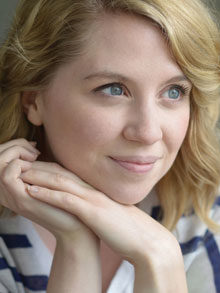
Grace Durham
BioGrace Durham
Born in London, Grace began her studies as a linguist, graduating in French and Italian from Clare College, Cambridge, before continuing her singing training at the Guildhall School of Music & Drama, the Royal Conservatoire of Scotland and the National Opera Studio.
From 2017-19 she was a member of the Semperoper Dresden Junges Ensemble, during which time she performed roles including Cherubino Le nozze di Figaro, Mercédès Carmen, Zweite Dame Die Zauberflöte, Lucienne Die Tote Stadt; Flora Bervoix La traviata and Clare in the German première of Philip Venables’ 4.48 Psychosis. Further operatic roles include Annio La clemenza di Tito, Prince Charmant Cendrillon, Dorabella Così fan tutte, and Hermia A Midsummer Night’s Dream.
An accomplished recitalist and concert singer, particularly in the French 20th-century repertoire, Grace recently made her recital débuts at the Opéra Grand Avignon, the Printemps de l’Académie Ravel festival in St-Jean-de-Luz and the Les Journées Ravel festival in Montfort-L’Amaury, where her repertoire included Ravel Shéhérazade, she also performs regularly as part of the Semperoper Dresden Semper Soiree recital series.
Rosina
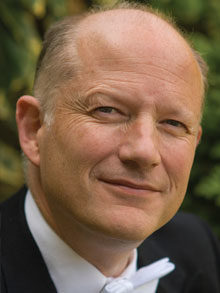
Charles Johnston
BioCharles Johnston
Described as “immaculate” and the “Jewel in the crown” by The Times for his portrayal of Sir John Falstaff for Mid Wales Opera, Johnston’s previous role highlights include the title role in Rigoletto, Giorgio Germont & Marquis d’Obigny La Traviata, Montano Otello, Narumov The Queen of Spades, Dr Kolenaty The Makropulos Case, Nikitich Boris Godunov, The Cardinal The Duchess of Malfi, Marquis d’Obigny La Traviata, 1st SS Officer The Passenger, The Guide Death in Venice (English National Opera); The Guide Death in Venice (La Scala, Milan; La Monnaie; De Nederlandse Opera; Concertgebouw, Amsterdam); The Traveller cover Death in Venice (Teatro Real, Madrid); Mr Gedge Albert Herring, Forester The Cunning Little Vixen, Garibaldo Rodelinda, Talbot Maria Stuarda, and
Scarpia Tosca (English Touring Opera); Don Alfonso Così fan tutte, Eisenstein Die Fledermaus, MarcoGianni Schicchi, Il Pedone La Wally, and Michonnet Adriana Lecouvreur (Opera Holland Park); Giorgio Germont La Traviata (Welsh National Opera); the title role in Puccini’s Gianni Schicchi (Haddo House); the King, Eight songs for a mad King (Electrostatic Festival); and the role of the Father/Sir Lancelot in Lynne Plowman’s Gwyneth and the Green Knight (Music Theatre Wales/Royal Opera House).
Dr. Bartolo
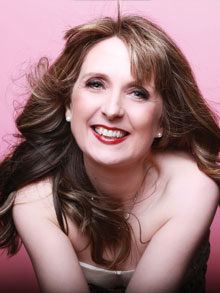
Sandra Oman
BioSandra Oman
A recipient of the Bank of Ireland/Vocal Heritage Society Margaret Burke-Sheridan Memorial Award for excellence in the field of opera, soprano Sandra Oman graduated from the DIT Conservatory of Music, advancing her studies in London with legendary La Scala soprano, Graziella Sciutti, and her husband, vocal coach Conor Farren.
Described as “outstanding” Opera Now (UK), “a talent to watch” Opera News (USA), and “un grand talent interpretative” L’Opera (Italy), Sandra has sung over 40 operatic roles in her career, for companies including Opera Ireland, Opera Holland Park, Longborough Festival Opera, Opera Project, Cork City Opera, Opera Interludes, Co-Opera, and Blackwater Valley Opera Festival. For Lyric Opera Productions, she has sung the principal roles in 11 productions, including Gilda Rigoletto, Liu Turandot, Susanna Le Nozze di Figaro, Micaela Carmen, First Lady Die Zauberflote, Musetta La Boheme. An experienced recitalist, she has performed with both the NSO and the RTECO and has 2 Number One Albums on iTunes to her credit, LIBERTY and NOËL.
Bertha
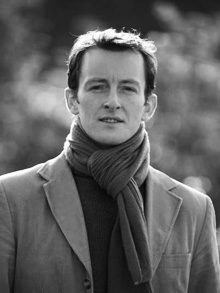
John Molloy
BioJohn Molloy
John Molloy, from Birr in Ireland, studied at the DIT Conservatory of Music & Drama, Dublin and the Royal Northern College of Music, Manchester. In 2005 he graduated from the RNCM, receiving the college’s highest accolade for performance; the PPRNCM Diploma.
John has received Awards and Bursaries from the Arts Council of Ireland, John McCormack Society of Ireland and was a major scholar of the Peter Moores Foundation from 2004 – 2006. Mr. Molloy was also a selected student of the National Opera Studio in London.
Notable roles include Arthur The Lighthouse with Nationale Reisopera, Sarastro Die Zauberflöte and Il Dottore La Traviata, Colline La Bohème, the title role of Figaro Le nozze di Figaro, Leporello Don Giovanni – all for Lyric Opera, Dublin, Masetto Don Giovanni with English National Opera, Figaro Le Nozze di Figaro with Nationale Reisopera, and Leporello DON GIOVANNI for NI Opera.
Future engagements include Budd ALBERT HERRING with the Buxton Festival, Swallow PETER GRIMES with the Teatro Comunale, Bologna, and the Messiah with the Leicester Philharmonic.
John has worked with many Opera Companies in Ireland and the UK including Opera North, Northern Ireland Opera, Lyric Opera, Dublin, Opera Theatre Company, and the D’Oyly Carte Opera Company. He has also performed at the festivals of Wexford, Ryedale, Mananan, The Farmleigh Proms and the Sir Malcolm Sergeant Festival in London.
Don. Basilio
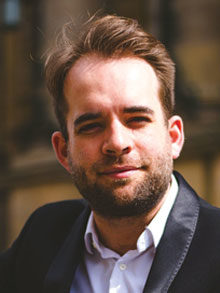
Timothy Burke
BioTimothy Burke
Born in Kingston, British conductor Timothy Burke read Music at Exeter College, Oxford, before training as a repetiteur at Guildhall School of Music and Drama, and winning the Sir Henry Richardson Scholarship to study at the National Opera Studio, going on to join the Jette Parker Young Artists Programme at the Royal Opera House, Covent Garden.
A passionate believer in the importance of new writing, he has, since 2013, been the Music Director at Tête à Tête, producer of the world’s largest festival of new opera, where he has premièred eleven new commissions, including Kerry Andrew’s Dart’s Love, winner of the Stage Works category of the British Composer Awards 2014.
He has conducted La Fanciulla del West for Opera Holland Park, The Barber of Seville for Opera North and Le nozze di Figaro for Welsh National Opera, as well as Will Tuckett’s The Wind in the Willows for the Royal Opera House, Covent Garden, and the 2017 Royal Northern Sinfonia Summer Prom.
Current engagements include Le nozze di Figaro for Scottish Opera, Tosca for Welsh National Opera, Patience for English Touring Opera, Christmas Eve for Chelsea Opera Group and Les enfants terribles for the Royal Ballet. He also conducts Opera Classics and Summer Classics with the Orchestra of Welsh National Opera and Dr Ferret and the Bad Medicine Roadshow for the Opera North Youth Company.
Conductor
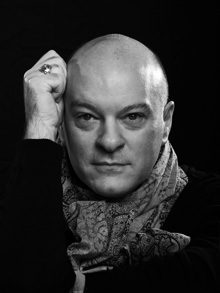
Vivian J. Coates
BioVivian J. Coates
Returning from abroad having worked in most of the opera companies in the UK, Vivian Coates has spent much of his career in Ireland nurturing young Irish talent on stage and guiding them on their first professional rung of the ladder. He has presented countless fully staged operas in Ireland through his company Lyric Opera, and is recognised for the tireless work he has done in keeping core opera alive in this city.
He is privileged to work across opera and musical theatre, directing and designing in most of the main theatres in Ireland; The Gaiety Theatre, Dublin, The Grand Opera House, Belfast, The National Opera House, Wexford and the National Concert Hall, Dublin. Opera productions include Aida, Il Trovatore, Don Giovanni, Hansel und Gretel, I Due Foscari, La Traviata, Carmen, Nabucco, Macbeth, La Bohéme. Turandot, Suor Angelica, The Turn of the Screw, Rusalka, Cavalleria Rusticana, Madama Butterfly and Attila among others. His musical theatre credits include Annie, The Sound of Music, Oliver!, Fiddler on the Roof, Carousel, 9 to 5, Camelot and many more.
Mr Coates has received many international accolades for his work. In 2007 he was honoured with a Knighthood and title of Cavaliere by the Italian Government for his work in presenting Italian opera in Ireland. In 2015 he designed for The Music of Northern Ireland, which received 4 EMMY’S in the 2016 roll of honour. And his recent productions with The 2018 International Gilbert and Sullivan Festival in Harrogate UK played to extraordinary acclaim, garnering five star reviews in The Stage & The Daily Mail.
Recent productions include Sweeney Todd (The National Opera House), La Traviata, Pirates of Penzance and La Bohème (NCH) and Carmen (NCH).
Director/Designer
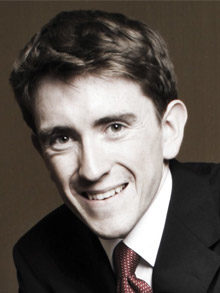
Richard McGrath
BioRichard McGrath
Richard holds a first class honours degree in Music and French from NUI Maynooth and a Masters in performance (piano accompaniment) from the Guildhall School of Music and Drama in London where he was also a student on the repetiteur course and subsequently held a repetiteur fellowship.
Richard was a trainee repetiteur at English National Opera and since then he has worked with companies including Northern Ireland Opera, Wide Open Opera, Opera Theatre Company and Lyric Opera. Productions.
Richard has worked on include The Second Violinist (WOO), Madama Butterfly (Lyric Opera), Carmen (Lyric Opera), La Bohème (ENO and OTC and Lyric Opera, Dublin), Il Barbiere di Siviglia (ENO and Wide Open Opera), The Last Hotel (Wide Open Opera), Rigoletto (OTC), L’Elisir d’amore (NI Opera and OTC), Nixon in China (Wide Open Opera) and La Traviata (ENO). He teaches at the DIT Conservatory of Music and Drama.